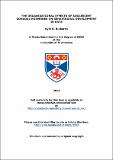The organisational effects of adolescent gonadal hormones on behavioural development in rats
Abstract
Gonadal steroid hormones play an important role in adolescent neural and behavioural development, causing changes that can be seen throughout life. Endogenous hormones have a direct impact on behaviour in both immediate and permanent ways by acting on multiple regions of the brain. The mechanisms that underlie the emergence of sexual and risk-taking behaviour during this time frame are yet to be fully understood. By using pharmacologic and surgical methods of suppressing gonadal steroids during adolescence, the effects of hormonal exposure on brain and behavioural development were examined in Lister-hooded rats (Rattus norvegicus). In these experiments, gonadal hormones were blocked in rats throughout adolescence using either gonadectomies or a pharmacological agent, then physical and behavioural measures were assessed into adulthood. Using a battery of behavioural tests including the elevated plus maze, light-dark box, open field test, and social tasks, the development of adult-typical anxiety-like, social, and risk-taking behaviours were evaluated. Males exposed to lower levels of testosterone during adolescence exhibited more feminized behaviour than their male counter-parts with unaltered levels of testosterone, including lower levels of anxiety-like behaviour in the elevated plus maze and light-dark box, as well as decreased social interactions in the juvenile play task and social preference test. These results provide evidence for the organisational effects of testosterone during adolescence on the development of behaviour, thus supporting the growing body of literature linking time-sensitive hormonal exposure to behavioural development.
Type
Thesis, MPhil Master of Philosophy
Collections
Items in the St Andrews Research Repository are protected by copyright, with all rights reserved, unless otherwise indicated.

